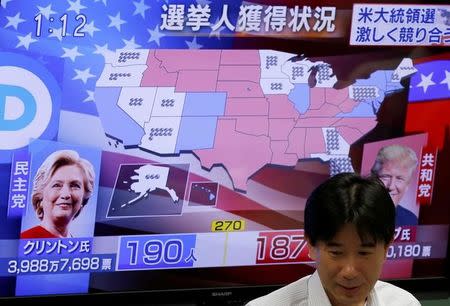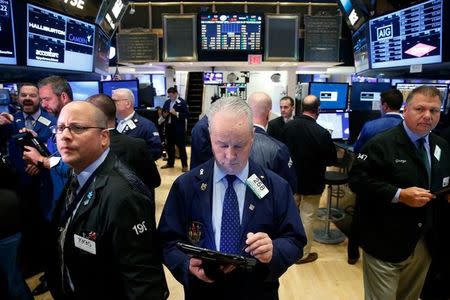U.S. stocks, bond yields jump after Trump shock, Mexican peso falls
By Sinead Carew NEW YORK (Reuters) - Wall Street stocks rallied on Wednesday after a dramatic overnight sell-off, while bond yields jumped on inflation expectations and the Mexican peso was battered as investors reacted to Donald Trump's surprise win in the U.S. presidential election. While equity investors' election night panic turned to daytime jubilation, bond investors worried Trump's protectionist policies would ultimately weaken the dollar and hike inflation. U.S. 30-year Treasury bond yields gained almost 25 basis points in their sharpest rise in more than five years. Benchmark U.S. 10-year note yields also advanced, climbing 21 basis points to their highest since January in their biggest increase in more than three years. The U.S. dollar rose across the board and hit its highest against the Japanese yen in nearly four months. It gained support from the equity turnaround and the yield spreads, said Kathy Lien, managing director at BK Asset Management in New York. The Mexican peso recouped some losses after falling to a record low. The currency has been vulnerable to Trump's threats to rip up a free trade agreement with Mexico and to tax money sent home by migrants to pay for building a border wall. The three major U.S. stock indexes rose as investors piled into financial and healthcare stocks on hopes of weaker regulation than was expected from a Hillary Clinton presidency. "The fact the Republicans control all three branches of government made a lot of people think that some of Trump's ideas that were pro-business - lower taxes and lower regulation - could actually be passed," Rick Meckler, president of investment firm LibertyView Capital Management in Jersey City, New Jersey. Goldman Sachs chief investment officer Sharmin Mossavar-Rahmani advised private wealth clients to "stay the course" on expectations for a large stimulus that would boost investments. Investors also recalled that global stocks' dramatic decline after Britain voted in June to leave the European Union was short-lived and was ultimately seen as a buying opportunity. The MSCI world stock index <.MIWD00000PUS> plunged as much 7.2 percent in the two trading sessions after the June 23 Brexit vote before rising 8.8 percent in the following 12 days. The index, which was flat on Wednesday, was 8.6 percent higher than the post Brexit low. But many money managers said they expect volatility in the coming weeks as the world awaits January's inauguration for more concrete clues of what a Trump presidency means. "Trump doesn't have a history in government that people can look back at," said Meckler. "Whatever he has to say in the coming weeks will have an oversized effect on the market." The Dow Jones industrial average <.DJI> closed up 256.95 points, or 1.4 percent, to 18,589.69, the S&P 500 <.SPX> had gained 23.7 points, or 1.11 percent, to 2,163.26 and the Nasdaq Composite <.IXIC> added 57.58 points, or 1.11 percent, to 5,251.07. UNCERTAINTY Trump's victory speech pledge that he would forge strong relations with other big nations helped ease some concerns about heavy tariffs being slapped on imports to the United States and a starkly more aggressive geopolitical attitude. But emerging markets bore the brunt of the Republican nominee's victory, with Mexico's peso still down 8.2 percent after falling more than 13 percent to hit a record low overnight. [EMRG/FRX] LibertyView's Meckler said he would be surprised if Asian stocks don't bounce back Thursday. MSCI's broadest index of Asia-Pacific stocks outside Japan <.MIAPJ0000PUS> ended down 2.3 percent Wednesday while Tokyo's Nikkei <.N225> fell 5.4 percent. In commodity markets, safe-haven gold sharply pulled back initial gains and were essentially flat at $1,275 an ounce after climbing as much as 4.9 percent to $1,337.40 . Oil prices recovered along with U.S. equities, with Brent crude up 0.96 percent at $46.47 a barrel and U.S. crude rising 0.6 percent to $45.27. [O/R] (Additional reporting by Chuck Mikolajczak, Caroline Valetkevitch, Gertrude Chavez-Dreyfuss, Karen Brettel, David Randall and Dion Rabouin in New York, Marc Jones in London and Wayne Cole in Sydney; Editing by Chizu Nomiyama and James Dalgleish)


